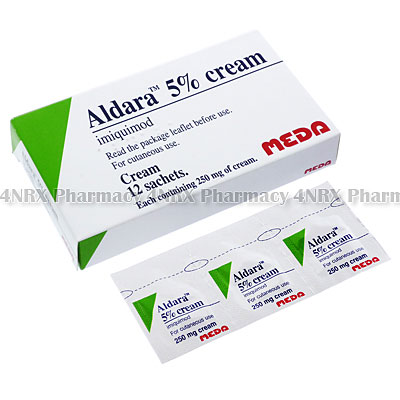 |
Home  Infection Infection  Aldara Cream (Imiquimod) Aldara Cream (Imiquimod) |
|
|||||||||
|
Aldara Cream (Imiquimod)
What is Aldara Cream (Imiquimod) used for? Aldara Cream (Imiquimod) is a topical cream used to treat actinic keratoses occurring on the scalp or face. It is also used to treat a type of skin cancer known as superficial basal cell carcinoma on the arms, legs and feet, as well as being used to treat warts affecting the genital and anal areas. This cream belongs to a class of medications known as immune response modifiers, which work by increasing the body's immune system activity. How should I use Aldara Cream (Imiquimod)? Aldara Cream (Imiquimod) should be applied directly to the affected area of the skin. The frequency of application and the length of time for which treatment is required depends on the condition being treated. Follow the instructions of your physician. For actinic keartoses, it is usually applied twice per week for 16 weeks. Treatment of superficial basal cell carcinoma requires application 5 times per week for 6 weeks, and if you are treating warts, you should apply it 3 times per week for as long as 16 weeks. This cream is normally applied just before going to bed and left on overnight. You should wash the treated area with soap and water the next morning. Do not cover the area you are treating with bandages. However, you may cover it with a cotton gauze or if you are treating the genital area, with underwear.What are the side effects of Aldara Cream (Imiquimod)? Patients who apply Aldara Cream (Imiquimod) may notice:
If you notice a breakdown of the skin or sores that have drainage, you should consult your physician immediately. Please Note Strictly follow all instructions provided to you by your physician or pharmacist while using Aldara Cream (Imiquimod). Optimum and safe dosage can differ based on the patient and the condition being treated. As this medication may be unsafe for certain patients, it is essential you always inform your physician if you are pregnant or breastfeeding, as well as if you have any allergies, other illnesses, or ongoing health conditions, and if you are taking any other form of medication, supplements, or herbal products. Immediately seek emergency medical care if you have any allergic or hypersensitive reaction. Common signs of a reaction include hives, swelling, skin rashes, chest pains, as well as trouble breathing or swallowing. 

|
|||||||||||||||||